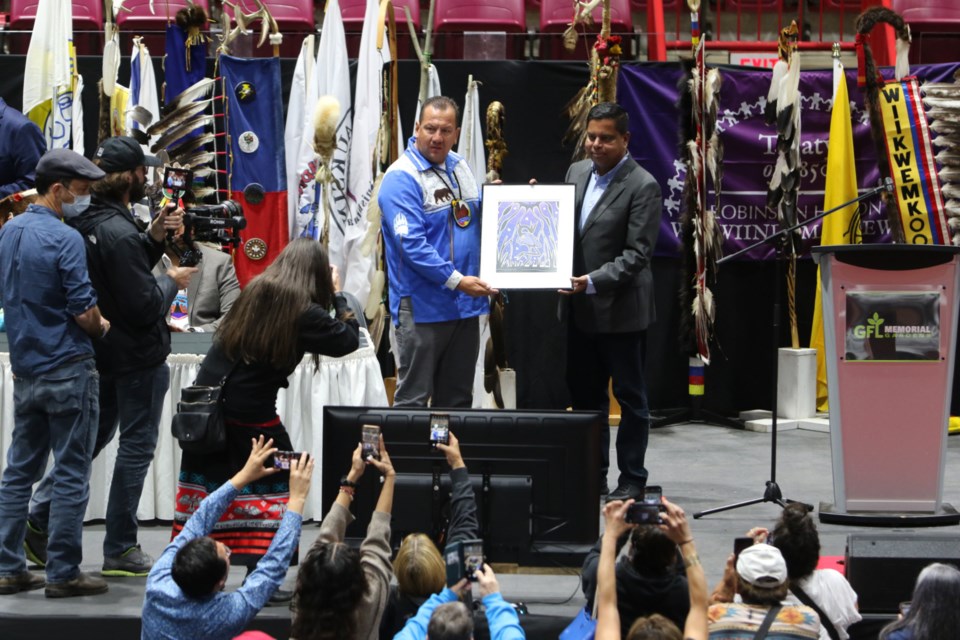Crown-Indigenous Relations Minister Gary Anandasangaree concedes the Crown has work to do when it comes to renewing the nation-to-nation relationship with its partners under the Robinson treaties of 1850.
Last week’s decision by the Supreme Court determined that Canada and Ontario “dishonourably breached its sacred promises” to the Anishinaabe of the upper Great Lakes by making a “mockery” of its treaty promise by failing to increase annuity payments for nearly 150 years, under a rare augmentation clause which required the Crown to increase annuities as revenues and wealth generated from resource extraction on the land grew over time.
“I think I would’ve used a combination of those words in the last year or so,” said Anandasangaree, who spoke with SooToday during a two-day stop in Sault Ste. Marie earlier this week. “Look, we have not been good treaty partners. The Robinson Huron settlement last year, I think, represented a shift in thinking and realization that we needed to sit down and hammer out an agreement that is fair and amicable, and reflects the true depth of the loss faced by First Nations people, particularly with respect to annuity payments.”
In 2018, Ontario Superior Court Justice Patricia Hennessy ruled the Crown had a "mandatory and reviewable" constitutional obligation under the 1850 treaty to increase annuities as wealth generated from the land grew, so long as the Crown could do so without incurring a loss.
A $10-billion settlement between the Robinson Huron plaintiffs and the Crown was finalized earlier this year, with Canada and Ontario agreeing to pay $5 billion each in past compensation.
A portion of the proceeds from the settlement is expected to flow into 21 First Nations in Robinson Huron Treaty territory next month.
The Superior plaintiffs chose to proceed with their claim, which seeks $126 billion in damages. The case resulted in a ruling last September, with the Supreme Court ordering it to be held in reserve pending the release of last week’s decision.
Justice Mahmud Jamal has ordered the federal and provincial governments hammer out an agreement with the Robinson Superior plaintiffs for past breaches of the augmentation clause within six months of the top court’s ruling.
“If the Crown and the Superior plaintiffs cannot arrive at a negotiated settlement, the Crown will be required, within six months of the release of these reasons, to exercise its discretion and determine an amount to compensate the Superior plaintiffs for past breaches,” Jamal wrote.
The Supreme Court justice determined that it would be “patently dishonourable” to not increase the annuity under the Robinson Treaties beyond $4 per person retrospectively, from 1875 to the present, noting that the Crown’s ongoing failure to augment annuities left the Anishinaabe with an “empty shell of a treaty promise for almost a century and a half."
Anandasangaree says he’s not surprised by the language used in last week’s Supreme Court decision. “I think it gives us a greater impetus to double down and have those conversations, so that we come to a fair settlement,” the minister said.
During a news conference held in Sudbury this week, the Robinson Huron Treaty Litigation Fund expressed its desire to negotiate a framework for the “go-forward aspect” of implementing the treaty, which would include future increases to the annuity.
Lead legal counsel David Nahwegahbow also spoke of the need to renew the “council fire” where all parties would engage in a deliberative process in order to come to an agreement.
“I think a return to that council fire, whatever the structure is, is going to be the first step,” Nahwegahbow said at the time. “That process, that structure — that council fire — will be the entity or the forum which is going to be driven not just by common law. It’s going to be driven by Anishinaabe law, and strong Anishinaabe participation from all of the First Nations.”
The Crown-Indigenous Relations minister says the treaty relationship between the Crown and First Nations under the Robinson treaties can be renewed by “being honest partners having dialogue.”
“We will continue to have those conversations to get to a place where there’s a fair reflection of the annuities going forward — and that conversation, I believe, is already on the way,” Anandasangaree said.
